Transforming Horizons: How AI is Revolutionizing Medical Education and Care
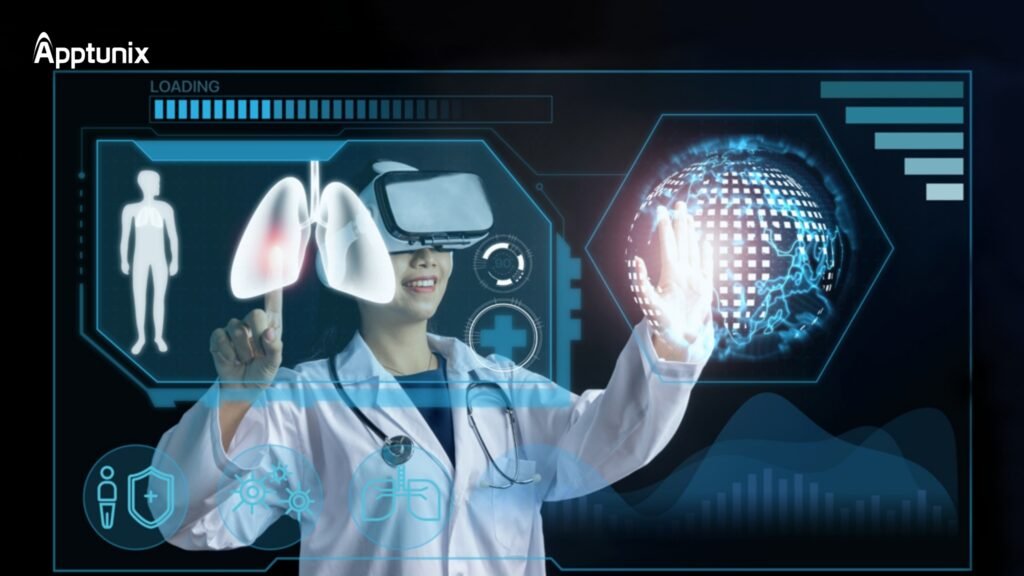
Introduction to AI in Healthcare
Artificial Intelligence (AI) has emerged as a transformative force within various sectors, with healthcare being one of the most significantly impacted domains. Ai revolutionizing medical fields in the world .The essence of AI lies in its ability to analyze vast amounts of data, learn from it, and make predictions or recommendations based on patterns identified. This capability is proving invaluable, particularly in medicine, where it enhances both educational frameworks and patient care protocols.
In recent years, the integration of AI into medical education has gained momentum as educators strive to equip healthcare professionals with the tools necessary to navigate a rapidly evolving landscape. AI is revolutionizing medical education by offering personalized learning experiences that cater to individual students’ needs. Through adaptive learning technologies, learners can engage with simulations and interactive platforms that help solidify their understanding of complex medical concepts.

Check how artificial intelligence is revolutionizing medical departments . There is a huge impact of artificial intelligence in the medical and also health care fields . It can also be emphasized by reading this post .
Moreover, AI’s relevance extends beyond education; it plays a crucial role in clinical settings, where it assists in diagnosing conditions, personalizing treatment plans, and improving overall patient outcomes. For instance, AI algorithms can sift through electronic health records (EHRs) to identify critical health insights, ensuring that healthcare providers can make informed decisions quickly. This capability is crucial in enhancing patient care, thereby fostering better health outcomes in a timely manner.
The ongoing advancements in AI technology not only streamline operational processes but also support healthcare practitioners in making data-driven decisions. By harnessing this technology, medical professionals can focus more on patient interactions rather than being bogged down by administrative tasks. As AI continues to evolve, its role in transforming medical education and patient care remains integral, promising a future where healthcare is more efficient, accessible, and effective.
Current State of Medical Education
The landscape of medical education has traditionally relied on established teaching methods, primarily focusing on lectures, textbooks, and hands-on clinical experiences. These conventional approaches are designed to equip future healthcare professionals with the essential knowledge and skills needed to navigate the challenges of patient care. However, the rapid evolution of medical knowledge and technology presents significant obstacles for educators striving to maintain the relevance and effectiveness of their curricula.
One pressing challenge is the sheer volume of information that medical students must absorb. The medical field is characterized by constant advancements in research, therapies, and diagnostic techniques. As a result, traditional educational models often struggle to keep pace, leaving students and educators feeling overwhelmed. This issue is compounded by the need for medical professionals to possess not only factual knowledge but also the ability to integrate that knowledge into complex clinical scenarios.
Student engagement is another critical concern within the current medical education system. Many students report feeling disengaged and disconnected from the material, which can lead to suboptimal learning outcomes. Traditional instructional methods may fail to capture the interest of modern learners who are accustomed to interactive, technology-driven experiences. This disconnect emphasizes the necessity for innovative educational approaches that foster active learning and retain student motivation. If you want best breakfast at half price in america then checkout Sonic Happy hour.
Curriculum limitations further exacerbate the challenges faced by medical educators. Many programs prioritize foundational sciences and clinical skills, often sidelining topics such as health informatics, ethics, and cultural competency. These subjects are crucial, especially as AI transforming medical education continues to reshape healthcare delivery. It is imperative for medical curricula to adapt and include interdisciplinary approaches that reflect the realities of contemporary medical practice.
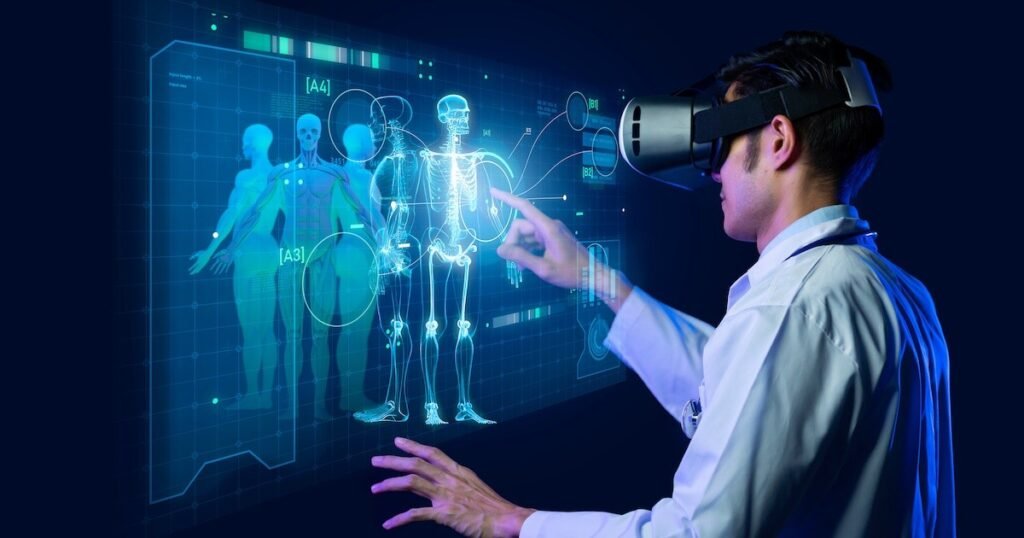
In conclusion, while current medical education systems have strengths, they must evolve to better prepare future healthcare professionals for a dynamic and complex field. Embracing innovative strategies and integrating technology can enhance student engagement and ensure that medical training is aligned with the needs of modern healthcare.
AI’s Role in Medical Education
The integration of artificial intelligence (AI) into medical education is marking a transformative shift in how healthcare professionals are trained. By harnessing the capabilities of AI, educational institutions can provide personalized learning experiences tailored to the unique needs of each student. This customization is crucial in catering to diverse learning styles and paces, ultimately enhancing student engagement and knowledge retention. Studies indicate that AI-driven platforms can analyze vast amounts of data, enabling them to recommend personalized study plans and resources that significantly improve learning outcomes.
Furthermore, simulation-based training leveraging AI technologies offers a highly effective alternative to traditional methods. These simulations replicate real-life medical scenarios, allowing students to practice their skills in a safe environment without the risk of harming patients. AI’s ability to provide real-time feedback and assessments during these simulations fosters a more interactive and reflective learning experience. For instance, research has shown that medical students who engage in AI-enhanced simulations demonstrate higher proficiency in clinical skills compared to those who rely solely on conventional teaching practices.
Intelligent tutoring systems, another facet of AI in medical education, provide an innovative platform for knowledge acquisition. These systems employ machine learning algorithms to adapt and respond to students’ individual learning paths, offering tailored support and resources. Statistics reveal that students utilizing AI-based tutoring have shown improvements in test scores and practical skills, emphasizing the significant impact of AI on medical training. As educational institutions continue to adopt these technologies, the potential for AI transforming medical education becomes increasingly evident, paving the way for more competent, confident, and skilled healthcare professionals in the future.
Impact of AI on Patient Care
The incorporation of artificial intelligence (AI) into medical education and patient care is rapidly transforming the landscape of healthcare. As healthcare professionals are trained in the use of these advanced technologies, they are better equipped to improve patient outcomes. AI tools have demonstrated their efficacy in various domains, including diagnostics, treatment recommendations, and patient monitoring, leading to enhanced efficiency in patient care delivery.
For instance, AI algorithms have been utilized in diagnostic imaging to analyze radiographs, CT scans, and MRIs with remarkable precision. A recent study published in the journal ‘Radiology’ highlighted that machine learning models could outperform human radiologists in the detection of certain types of cancers. Such findings underscore how AI transforming medical education empowers future healthcare practitioners with the knowledge and skills to leverage these technologies, ultimately leading to more accurate diagnoses and timely interventions.
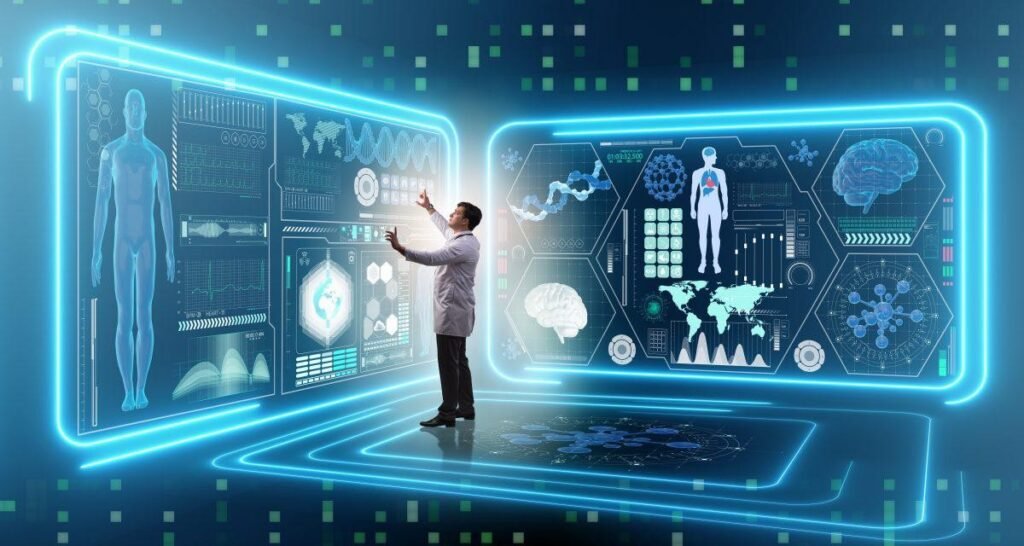
Additionally, AI-driven platforms are being used to generate tailored treatment plans based on individual patient profiles. By analyzing vast datasets of clinical data, AI systems can provide evidence-based treatment recommendations, thus enhancing personalized medicine. A notable example is IBM Watson for Oncology, which assists doctors in identifying effective treatment options for cancer patients by synthesizing information from various clinical studies. This amalgamation of AI and patient care reflects the growing trend of utilizing technology to foster better clinical decision-making.
Moreover, remote patient monitoring has gained traction through AI technologies like wearable health devices and mobile health applications. These tools facilitate real-time data collection and analysis, empowering healthcare providers to monitor patients’ conditions more efficiently. A study in the ‘Journal of Medical Internet Research’ indicated that utilizing AI for remote patient monitoring significantly reduced hospital readmissions for chronic disease patients by providing timely alerts to healthcare teams when intervention was necessary.
Through these transformative practices in patient care, it is evident that AI is not only enhancing the capabilities of healthcare professionals but also contributing positively to patient outcomes, marking a pivotal shift in healthcare delivery systems.
Leadership in the Age of AI
The advent of artificial intelligence has undoubtedly shifted the landscape of medical education, necessitating an evolution in leadership qualities among healthcare administrators and providers. As AI is transforming medical education and care, leaders must be equipped with a deep understanding of technology, as well as the strategic foresight to harness its capabilities. The ability to integrate AI tools into existing educational frameworks is crucial, necessitating leaders who are not only technologically savvy but also open to continuous learning.
Effective leadership in this AI-driven era requires a blend of communication skills and emotional intelligence. As institutions adopt AI technologies, leaders must foster an environment of collaboration among multidisciplinary teams, recognizing that the successful implementation of AI goes beyond technical proficiency. They are tasked with bridging the gap between the technical staff and clinicians, ensuring all healthcare providers understand the potential of AI in enhancing patient outcomes and educational methodologies.
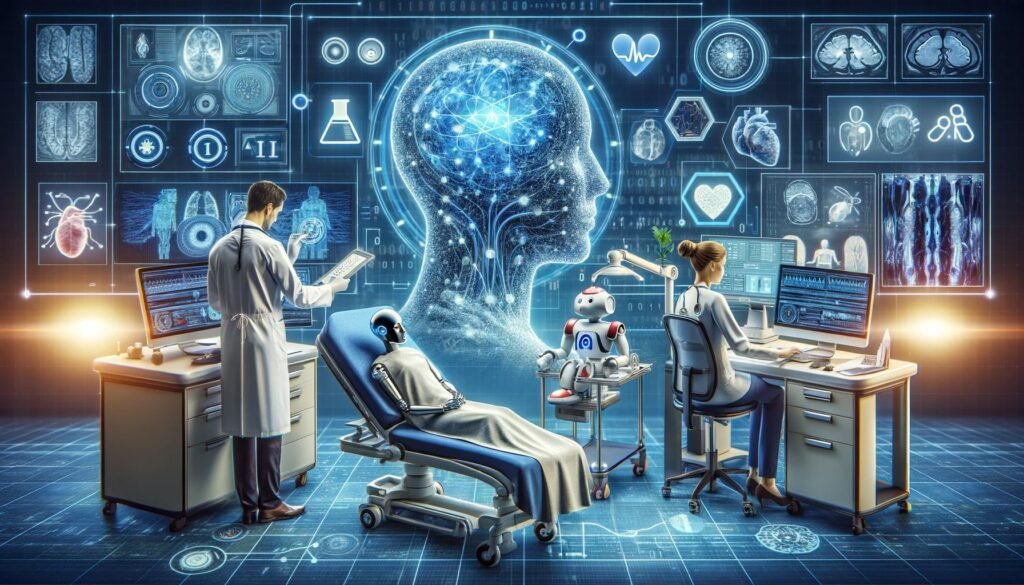
Furthermore, leaders must exhibit adaptability and resilience in the face of rapid change. The landscape of medical education is perpetually evolving, with new AI applications emerging that can enhance it. Leaders need to continuously assess and recalibrate strategies in order to effectively integrate these innovations into training and practice. Additionally, a strong ethical framework is essential, as leaders must navigate the complexities of privacy, bias, and accountability associated with AI technologies. Responsible stewardship of AI also demands that leaders advocate for equitable access to these resources, ensuring both healthcare providers and patients benefit from advances in medical education.
In conclusion, healthcare leaders play a pivotal role in the ongoing transformation brought forth by AI in medical education and care. By embracing these critical qualities, they can successfully navigate the complexities introduced by this technology, ultimately benefiting the entire healthcare system.
Challenges and Pitfalls of AI in Medicine
The integration of artificial intelligence (AI) into medical education and care promises a transformative potential, yet it also presents a series of challenges that must be addressed to maximize its benefits responsibly. One prominent concern revolves around ethical considerations. As AI technologies become more integrated into medical practices, issues related to accountability arise, particularly when decisions are influenced by algorithms. There is an urgent need for clear ethical guidelines that govern the use of AI in clinical settings to ensure that patient welfare remains the priority.
Data privacy is another critical challenge. The vast amounts of personal health data required for AI systems to function effectively raise significant concerns regarding confidentiality and consent. As these systems are developed, it is imperative that robust measures be implemented to safeguard patient information, thereby maintaining public trust in medical institutions using AI technologies. Without stringent data protection frameworks, the risk of breaches or misuse increases, potentially resulting in unwanted consequences for patients.
Bias in AI algorithms also poses a significant issue. Many AI systems are trained on datasets that may not adequately represent diverse populations, leading to unfair or inaccurate conclusions that could adversely affect underrepresented groups. Addressing this bias is crucial to ensure equitable access to AI-enhanced medical education and care. Researchers and developers need to actively seek ways to identify and mitigate bias during the design and implementation phases of AI technologies.
Finally, the necessity for regulatory frameworks cannot be overstated. As AI continues to evolve, the healthcare sector requires established safeguards that dictate how these technologies should be deployed and monitored. Regulatory bodies must collaborate with stakeholders to develop comprehensive policies that ensure responsible use, effectiveness, and transparency of AI applications in medicine. Only then can the advantages of AI transforming medical education and care be harnessed responsibly and ethically.
The Importance of Human Skills in an AI World
The advent of artificial intelligence (AI) transforming medical education has generated significant excitement and anticipation across the healthcare sector. However, as these advanced technologies become more integrated into medical training and practice, safeguarding and nurturing human skills remains crucial. While AI offers promising tools for enhancing knowledge acquisition and operational efficiency, it cannot replace the essential human qualities required in healthcare—such as empathy, communication, and critical thinking.
Empathy is a cornerstone of effective patient care, enabling healthcare professionals to build meaningful relationships with patients and their families. Even the most advanced AI systems, equipped with vast amounts of medical data, cannot replicate the nuances of human emotional understanding. This human connection contributes to patient trust and satisfaction, two factors integral to positive health outcomes. As AI continues to elevate the capabilities of medical professionals, it is vital to foster these human skills through a balanced approach in medical education, ensuring that practitioners can still connect on a personal level.

Furthermore, critical thinking is indispensable in diagnosis and treatment, where situations may not be straightforward. AI can assist in analyzing vast data sets, but it cannot replace the necessity for professionals to synthesize that information with their clinical judgment, experience, and understanding of patient context. The ability to evaluate complex scenarios, consider ethical implications, and make informed decisions must remain a central focus of medical training, as these aspects further enhance the relationship between AI and human capabilities in healthcare.
In conclusion, while AI is transforming medical education and offers enriching tools and resources, the importance of maintaining robust human skills cannot be overstated. Balancing AI with empathy, communication, and critical thinking will ensure that healthcare professionals are not only equipped with advanced technology but are also adept at providing compassionate and comprehensive care to their patients.
Future Perspectives: The Path Ahead
As we delve into the future of healthcare, it is increasingly evident that artificial intelligence (AI) is set to play a pivotal role in transforming medical education and patient care. The continuous advancement of AI technologies brings significant promise, not only for enhancing educational methodologies but also for delivering superior healthcare outcomes.
One of the most anticipated trends is the development and implementation of personalized learning pathways within medical education. With AI transforming medical education, educators can utilize data-driven insights to tailor curricula that meet the diverse needs of learners. This approach fosters a more effective learning environment, allowing students to progress at their own pace while honing their skills through adaptive learning technologies. Experts argue that this customization may lead to a generation of healthcare professionals who are better equipped to handle complex clinical scenarios.
Moreover, advancements in AI applications are expected to revolutionize patient care. Predictive analytics will become more refined, allowing healthcare providers to anticipate patient needs and preemptively address potential health issues. This proactive approach in utilizing AI tools and data analytics will not only enhance decision-making in clinical settings but also contribute to more efficient healthcare delivery systems. Industry professionals predict that this evolution will shift the emphasis from reactive care to preventative measures, fundamentally transforming how healthcare is approached.
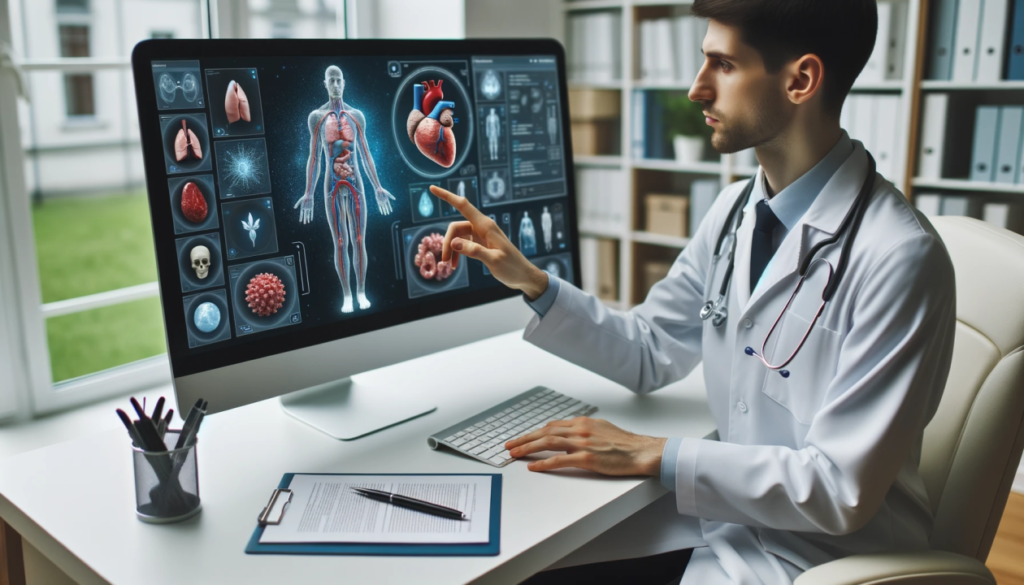
Another promising trend involves the integration of virtual reality (VR) and augmented reality (AR) facilitated by AI systems for immersive training experiences in medical education. These technologies can simulate real-life medical procedures, enabling students and professionals to practice hands-on skills in a safe environment. As AI continues to advance, the amalgamation of these technologies is likely to redefine training methods, bridging the gap between theoretical knowledge and practical application.
In conclusion, as we explore the horizon of healthcare and education, the integration of artificial intelligence symbolizes a significant turning point. With ongoing research and strategic implementations, the potential for AI to transform medical education and patient care appears limitless. The collaboration between technology and healthcare professionals will be crucial in navigating this evolving landscape, ensuring optimal outcomes for future generations.
Conclusion: Embracing AI Responsibly
The integration of artificial intelligence (AI) into medical education is rapidly transforming the landscape of healthcare training and delivery. Throughout this discussion, we have explored the various ways in which AI technologies are enhancing educational methodologies, personalizing learning experiences, and equipping future healthcare professionals with the necessary tools to thrive in an evolving medical environment. From virtual simulations to adaptive learning platforms, AI is not just a supplementary resource; it plays a central role in shaping a comprehensive educational framework.
However, while the potential benefits of AI in transforming medical education and care are enormous, it is crucial to approach its implementation with careful consideration. Responsible AI integration requires a collaborative effort among educators, healthcare practitioners, and technology developers. Together, these stakeholders must assess how AI can support—not replace—the key human elements of healthcare. This collaborative approach ensures that the implementation of AI technologies fosters improved patient outcomes, while also respecting the ethical and moral implications of automated decision-making in clinical settings.
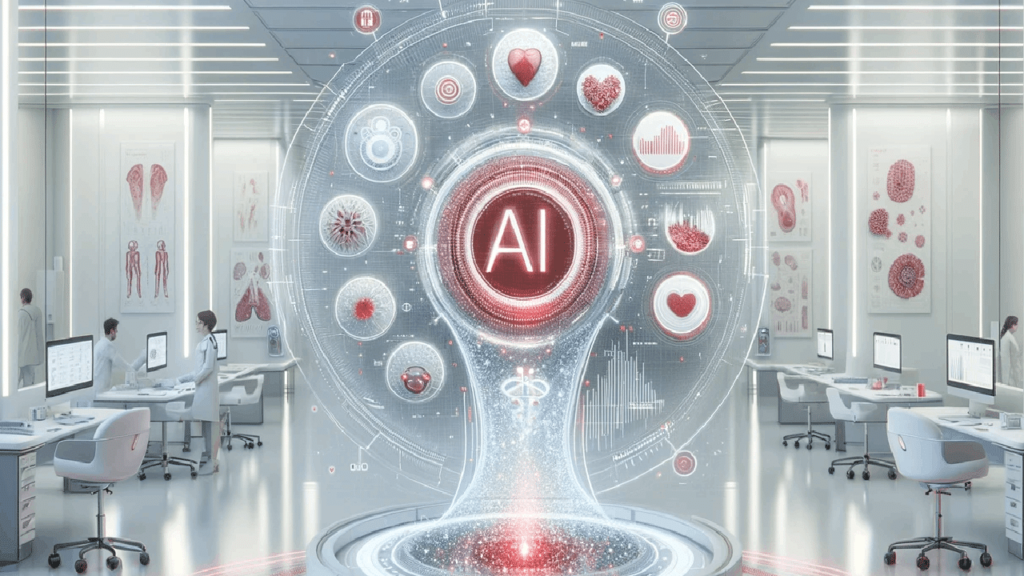
Moreover, as the field of AI continues to evolve, ongoing evaluation and adjustment will be essential. This adaptability will help to mitigate any unintended consequences that may arise from AI’s increasing presence in medical contexts. By prioritizing transparency, accountability, and ethical standards, we can harness the power of AI to enhance, rather than hinder, the human aspects of medical care. This balance is essential to ensuring that the integration of AI into medical education and healthcare not only enhances efficiency but also upholds the compassionate principles that are fundamental to patient care. As we move forward, embracing AI responsibly will set the stage for a future where technology enhances the healthcare experience for all stakeholders involved.

